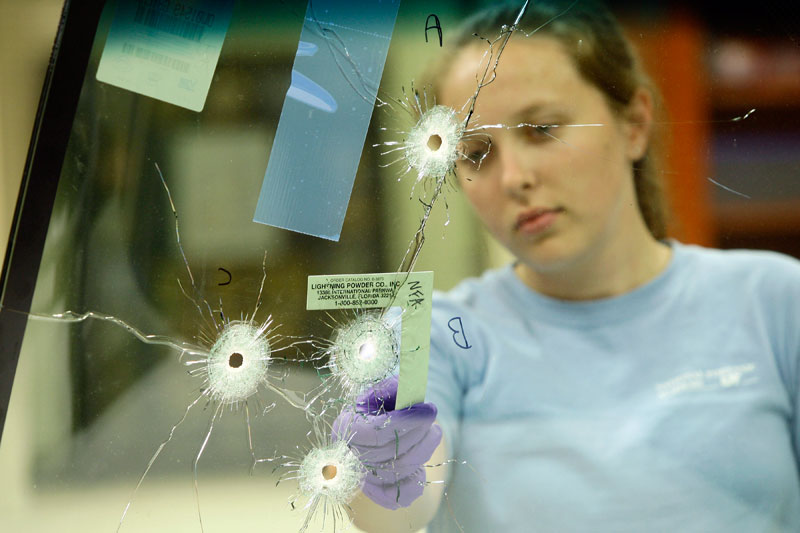Students complete first NFA college program
By Susan Robertson
Madison Kimbrell of UT Knoxville dusted a picture frame for fingerprints with close supervision from Tim Schade of the Knoxville Police Department while Kelsea Hunt from UT Martin lifted prints off a compact disc.
By participating in the first National Forensic Academy College Program, these students got a sample of the kind of training professional crime scene investigators receive.
Twenty-four students from 10 universities completed the NFA program, a joint venture between the University of Tennessee at Martin and the UT Law Enforcement Innovation Center (LEIC).
“This idea came from our advisory board. The advisory board members were interested in seeing us expand our training,” says LEIC Executive Director Don Green. “We looked for a UT campus that could partner with us, and UT Martin, which has a strong criminal justice program, was in a position to participate.”
The students spent three weeks last summer at the LEIC facility in Oak Ridge in an abbreviated version of the center’s well-known 10-week, in-residence crime scene investigator training for law enforcement professionals. They studied basic crime scene management, forensic digital photography, latent fingerprint processing, bloodstain analysis and forensic anthropology under the same instructors who teach at the 10-week academy.
“So many students who come in to major in criminal justice think crime scene investigation is going to be like what they see on television. This academy did a great job of letting them see it’s not like that, and it gave them tremendous hands-on experience,” says Brian Donavant, associate professor of criminal justice at UTM and the program’s instructor of record. “The students were able to use this great facility and learn from some of the top subject matter experts in the country.”
Donavant says taking students out of the passive classroom mode and bringing them together in an intense interactive learning environment helped them learn to collaborate and work as a team.
“We had a variety of participants—students who are interested in criminal justice, students who are already seeking a degree in that field and one who is already in the law enforcement field.”“This develops interpersonal skills that make these students valuable commodities to future employers and add to the value of their degrees,” he says.
UT Martin sent 16 students to the academy. Other students were from UT Knoxville, East Tennessee State University, Bethel University, Tennessee Technological University and Dyersburg State Community College. Several other students attended from out-of-state colleges including Regis University in Colorado, University of North Alabama, Whittier College in California and Wichita State University in Kansas.
“The success of the program this year surpassed our initial desires,” Green says. “We had a variety of participants—students who are interested in criminal justice, students who are already seeking a degree in that field and one who is already in the law enforcement field.”
Ginger Perry, a senior from UT Martin, says the training built confidence.
“This experience offered great opportunities, but it was not without its challenges, both physically and mentally,” Perry says. “Although we faced these challenges, they were never presented without guidance and assistance. The personnel, staff members and instructors took a personal interest in assuring that we received the best education possible and that we left the academy with the confidence that we had reached our fullest potential.”
Alethia Fenney, who is pursuing her master’s degree from Regis University in Colorado, also praised the training she received.
“I had heard of the National Forensic Academy and wanted to attend, but I was told it is only for those already working in law enforcement,” Fenney says. “Then I found out that they were doing the three-week college program and said, ‘Where can I sign up?’ It’s been a great experience.”
Green and Donavant are working on ideas for next year’s academy.
“We’ve already started planning, and we’ve had several people register,” Green says.
For more information on the program, visit www.utm.edu/departments/behsci/cj_nfacp.php



